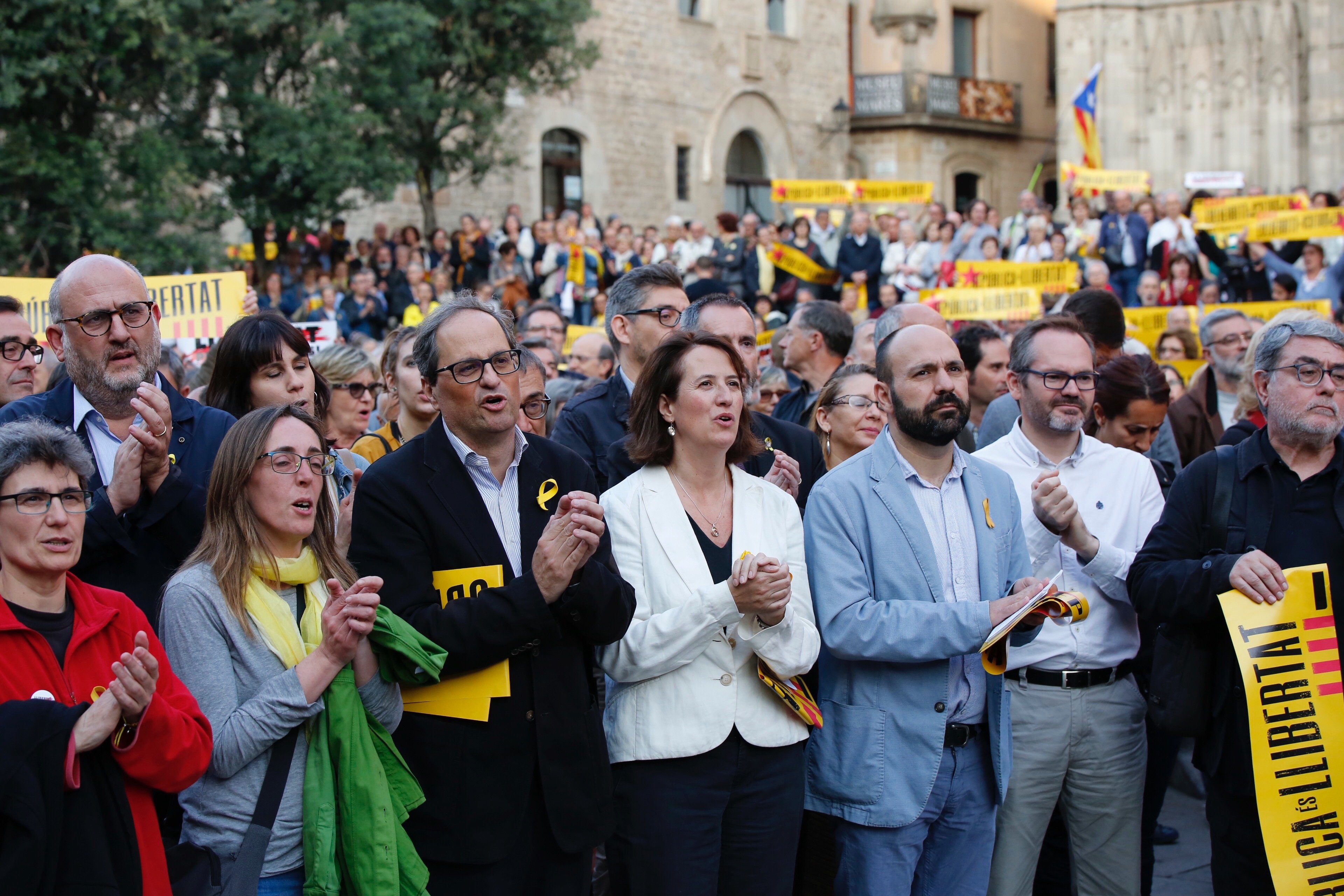This Wednesday marks seven months since Jordi Sànchez and Jordi Cuixart lost their freedom. Since then, they've been held in pretrial detention without bail in Soto del Real prison near Madrid investigated on charges of rebellion. Today, hundreds of people have gathered in front of Barcelona Cathedral to demand their release. Also present was Quim Torra, who wanted to express his support to the families of the political prisoners. The brand-new president-elect was on the front row for the whole event.
The gathering, organised by ANC and Òmnium Cultural, became another call for the release of the prisoners and the return of the exiles, the same day that Spain hit a setback with a Belgian court refusing to extradite ministers Toni Comín, Meritxell Serret and Lluís Puig. The hundreds of protesters in the square in central Barcelona demanded the end of the repression of the independence movement. "Not all of us are here, the prisoners are missing", they shouted, as well as "we want you home".
The demonstration included a large delegation of representatives of the pro-independence parties (JxCat, ERC and CUP), but also from Comuns, like Joan Josep Nuet. After president Torra, the highest-ranking officials were the first deputy speaker of the Parliament, Josep Costa and the chamber's first secretary, Eusebi Campdepdrós.

Roger Español
Roger Español, leading role
One of the main protagonists of the gathering was Roger Español, who lost an eye to a police rubber bullet during the repression of last year's referendum. "The 1st October has brought many things", he said, referring to the day of the vote. "That day we started on a path and took the first step. Now, I want to say that when we lose strength or there are stumbling blocks in the way, we should remember that day and the moments of communion before and after," he continued. "Think of that strength that moved us". He described the Spanish state as "fascist" and Spanish justice as the "spearhead" against Catalan society.
Town councillor Jordi Pessarrodona, who was indicted for wearing a clown nose in front of Civil Guard agents on 20th September, argued for the restoration of the "legitimate government". He celebrated that his case has been provisionally shelved, but warned that, like in his case, a "falsified report" from the Civil Guard is what is keeping the 'Jordis' in prison. "The only way we artists have to protest is to add a touch of humour," he said.
Mechanic Jordi Perelló, from Reus, accused of a hate crime for refusing to repair a car belonging to the Spanish police, said that "I promised myself that I would never again have anything to do with these people" after seeing the police attacks on voters during the referendum. "It's cost me a hate crime. It's a version 2.0 of the Franco-era ley de vagos y maleantes," he said, "they want us to be scared, but we are not nor will we be scared". The ley de vagos y maleantes (vagrants and miscreants law) was a law about the treatment of various groups deemed anti-social, including beggars, pimps and "regular drunks".

Posters of some of the exiled and imprisoned pro-independence leaders.
“In how many more languages will they need it explained?”
Vice-president of Òmnium, Marcel Mauri, celebrated the Belgian court's decision in his speech as having "shown up the arbitrary use" of legal measures made by the Spanish justice system. "In how many more languages will they need it explained to them," he asked. He also made a appeal to president Torra, taking advantage of his presence at the event the day before his official inauguration: for him to have a "firm commitment" in the defence of freedom. "They still haven't understood that the political prisoners aren't the representation of any defeat, but a symbol of a process which won't end until the citizens of this country decide it will," he argued.
For her part, the new president of the ANC, Elisenda Paluzie, started by reading a letter from Jordi Sànchez from Soto del Real entitled "we've beaten fear". "On 1st October we overcame fear and won the right to have an independent state in the form of a Republic", said Paluzie, evoking the language of the referendum's question. She lamented that the republic wasn't then implemented after being declared on 27th October. "We won't stop until you're free", she said as a message to the prisoners. She also congratulated Comín, Serret and Puig on today's verdict, which she described as the first victory "of more to come" from European justice.

